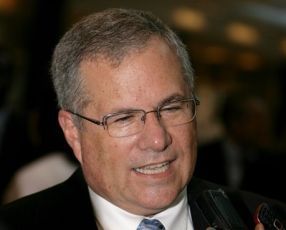Sudan says Gration’s visit to East had nothing to do with politics
February 6, 2011 (KHARTOUM) – A two-day visit by U.S Special Envoy Gration to eastern Sudan this week had nothing to do with the political situation there, the country’s foreign ministry has said, following reports that he was not allowed to meet local opposition.

But Gration was not allowed to meet rebels from the Beja Congress because his visit was not permitted by the authorities in Khartoum, according to a report published on Friday by the daily newspaper Al-Raed, which is affiliated to the ruling National Congress Party (NCP).
Named after the largest non-Arab ethnicity in the region, the Beja Congress is the former eastern rebel group which in 1994 took up arms together with the Free Lions of Rashidiya Arab tribe against the central government in Khartoum, accusing it of marginalizing the east.
The conflict in the grossly underdeveloped region ended in 2006 with the signing of the Eastern Sudan Peace Agreement (ESPA) under Eritrean mediation.
The US embassy’s statement contended that the envoy’s visit was “fully approved by and was closely coordinated with the Sudanese authorities in Khartoum.”
The embassy’s claim was confirmed on Saturday by the official spokesman of Sudan’s Ministry of Foreign Affairs, Khalid Musa, who told reporters in Khartoum that his ministry did give Gration a permission to visit the state.
Musa, however, stopped short of explaining why Gration was not allowed to meet the opposition.
Instead, he said that the only purpose of Gration’s visit was to meet local officials, including the minister of education, and assess humanitarian situation.
The spokesman further asserted that Gration’s visit had nothing to do with the political situation in the east, nor does it mean that the U.S had entered into the affairs of East Sudan.
He added that the issue of east Sudan had been sealed with a political agreement whose implementation was “progressing as planned.”
The ESPA promised government jobs and 600 million dollars for development over five years. Accordingly, a development and reconstruction for East Sudan was established but little has been achieved, fuelling bitterness among the region’s four million inhabitants.
Gration’s visit also coincided with a tense political climate in the state after the long absence of the state’s governor Mohamed Tahir Iyla in Saudi Arabia gave rise to speculations that he was disgruntled with the NCP’s leadership in Khartoum.
However, Iyla returned to the state and participated on Friday at a rally in which the NCP’s deputy president Nafi Ali Nafi dismissed rumors of his defection as propagated by “circles targeting East Sudan and eying its wealth.”
Opposition groups in the Red Sea accuse Iyla of accumulating a personal wealth out of development projects and using ’divide and conquer’ tactics to consolidate his rule.
The drought-stricken East Sudan covers an area of 336,480 square kilometers and consists of three states, including the Red Sea State, Kassala State and Al-Qadarif State.
Despite having the one of the highest rates of malnutrition in the country, the region is believed to be rich in agricultural and mineral resources and is being seen as a potential hub for the growth of mining, tourism, gas and oil exploration and development of agricultural and animal husbandry.
Located on the Red Sea, Port Sudan town is the main port city and economic lifeline through which the country’s oil is exported.
A donors’ conference for East Sudan held in September in Kuwait pledged $3.5 billion to develop the region.
(ST)
